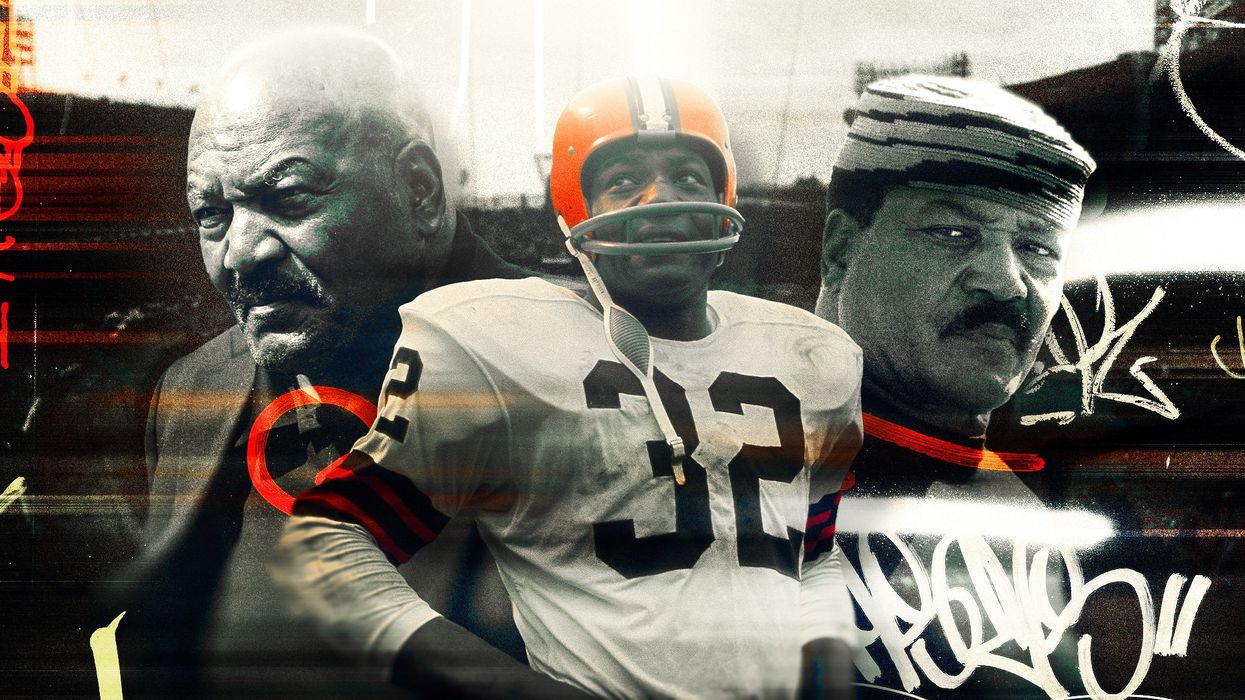
Diamond Images / Contributor, Focus On Sport / Contributor, Markus Boesch / Staff | Getty Images

Jim Brown never sold out. That’s his legacy. He couldn’t be bought or compromised. He epitomized the kind of masculinity America now rejects as toxic.
Brown, 87, died on Friday. People will struggle to accurately define him. He’s far more than the greatest running back ever to play professional football. He was not a civil rights activist. Attempts to paint him as a serial domestic abuser with unproven allegations come across as a smear to taint his reputation and impact.
No sellout.
Those two words make Jim Brown unique and the most important athlete of the last 65 years. Brown evolved without changing. He stood on a set of principles and values regardless of consequence. His peers did not.
Muhammad Ali changed. He disavowed the Nation of Islam, never apologized for racially denigrating Joe Frazier, and became the darling of white liberal America.
Bill Russell chose the same path as Ali, the adulation of liberal America over truth. Russell dumped his first wife and college sweetheart, Rose Swisher, for Miss USA 1968, Dorothy Anstett. He then married two more times before his death.
Kareem Abdul-Jabbar is arguably one of the worst sellouts in sports history. He skipped the 1968 Olympics to protest U.S. governmental policies. He is now an unofficial spokesman for the experimental medical vaccines supplied by our government and virtually anything else the Democratic Party tells him to endorse.
For 87 years, Jim Brown could not be controlled. He thought for himself and did what he believed. When Russell was releasing pictures of himself on a knee in support of Colin Kaepernick, Brown was telling Kaepernick to choose between activism and football.
“I’m going to give you the real deal: I’m an American,” Brown said. “I don’t desecrate my flag and my national anthem. I’m not gonna do anything against the flag and national anthem.
“If you have a cause, I think you should organize it, present it in a manner where it’s not only you standing or sitting on one knee, but a lot of people can get behind it and do something about it.”
Brown quit football at age 29 to pursue acting opportunities in Hollywood. In 1988, he launched the Amer-I-Can program, a life-skills teaching organization that mentored gang members. Brown never believed in pointless gestures and symbolism. He believed in organization and programs. Amer-I-Can developed a curriculum specific to developing men into productive citizens.
Brown was uninterested in creating “awareness.” He was about creating solutions.
I first met Jim in the early 1990s. He spoke at Indiana University. I attended the event as a sports writer for the Bloomington Herald-Times. Brown abrasively blew me off as I followed him down a hallway pestering him with questions.
His gruff demeanor reminded me of my father. I told him he couldn’t offend me or scare me off because I was “Jimmy Whitlock’s son” and he reminded me of my dad. That caught Brown’s attention.
As my profile escalated as a sports writer, Brown began returning my phone calls. I eventually visited him in Los Angeles and learned more about Amer-I-Can and the guys who worked with the football legend – Rockhead Johnson, Julian Mendoza, and Bobby Glanton.
In 2008, I wrote a long profile for Playboy magazine on Brown’s organization. Brown backed his commitment to slowing gang violence in Los Angeles with an organization dedicated to doing just that and opening his home to men the rest of America feared.
Jim’s peers chased checks and adulation. Jim worked. He spent his own money. He took real risks to achieve his cause.
Jim was authentic in a way most athletes are not. Modern pro athletes worship “the bag.” They all have a price. They want to be billionaires. They’ve bought the lie that the black community suffers from a financial crisis, not a spiritual crisis.
I never remember discussing religion with Jim. I do not know his religious beliefs. What I know is that Jim believed in purpose. He lived a purpose-driven life. His purpose required him to stand on a set of principles and values. Amer-I-Can tried to instill those principles and values in other men.
The modern black athlete is a narcissist. He believes that the more wealth he acquires, the better things will be for black people. Brown believed in sharing with others the values and principles that made him successful.
Again, I do not know Brown’s faith. However, I do feel confident arguing that it is more biblical to spread good values among men than to pursue financial wealth.
The pursuit of money eventually triggers selling out.
That’s what makes Jim Brown special, a man among boys. Modern American culture celebrates black sellouts. From Jay Z to LeBron James to Dr. Dre to Al Sharpton to Stephen A. Smith, popular culture loves the high-profile black man willing to abandon every common-sense principle in service to his bank account. From the matriarchy to transgenderism to same-sex marriage to abortion, there’s nothing a black celebrity won’t endorse to protect his finances.
Long live Jim Brown. A real man. A real hero. No sellout.
Jason Whitlock
BlazeTV Host